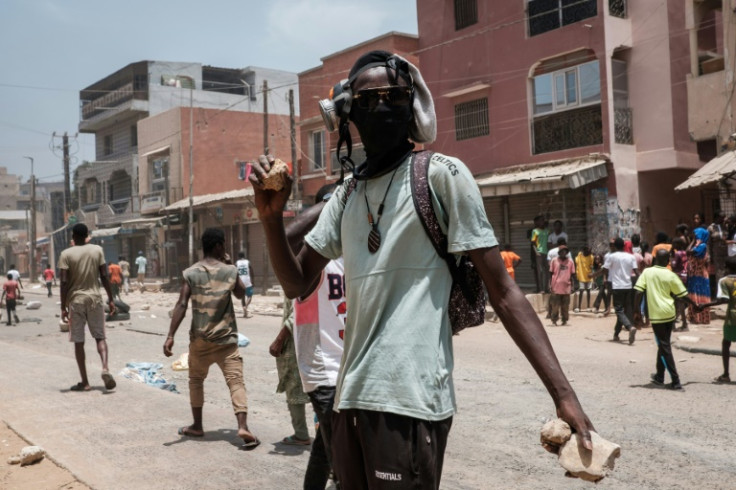Youth Give Voice To Anger At Senegal 'Injustice'

Twenty-year-old Omar Diop didn't take part in the violent demonstrations in Senegal over the jailing of a popular opposition leader, but says he fully understands the young protesters' anger.
The clashes prompted the authorities to deploy the army. Nine people died on Thursday and six more Friday during the protests following the two-year sentence handed out to opposition politician Ousmane Sonko, who may now be ruled out of contesting next year's presidential election.
"What happened is tough -- the dead and destroyed property -- but it could have been avoided if (President) Macky Sall had not forced it on us by sentencing Sonko," Diop says.
Diop is far from alone in Senegal in believing Sonko;s claims that he government cooked up the rape charges he faced to knock him out of the election race.
Sonko, who came third in the 2019 presidential election, carries the hopes for change of many youngsters in Dakar's working class neighbourhoods who face the full force of the economic downturn.
Suspicions of a plot against Sonko seemed confirmed for some when the verdict against him was announced on Thursday.
After two years of rape allegations, the court switched the charges and found him guilty of "corrupting" a young woman, in a case which has deeply divided the West African nation.
Sonko, who was tried in absentia, has yet to be taken into custody for his jail term, which is likely to cause further tensions.
Diop, who left school very early, sympathises with Sonko's plight, saying: "He was accused of rape then he was sentenced for something else. It's not fair."
"The youth are suffering as well in Senegal. I drive a motorbike because I don't have anything else to do," says Diop.
Sonko's sentence, if it is upheld on appeal, makes him ineligible for public office. The scale of the perceived injustice led many to take to the streets.
President Sall "wants to put an end their hopes for a better life in Senegal," said Aliou Faye, aged 25.
His home town of Rufisque, outside Dakar, bears the scars of the violence -- fires still burning and a scattering of rocks.
The shops are shut near the railway station which boasts a new fast train to the capital and surrounds. The express line, one of the president's grand projects for a developing nation, has been closed since Thursday.
"The youth are in revolt because they want change," explains Demba Faye, also 25.
"Times are hard. There's no work, no money and living costs are expensive. But I did not join the protests. I'm waiting for the election to pick my candidate."
Half of the 18 million population are under 18 years old, according to the official statistics.
There was extensive destruction on Dakar's main university campus, where prolonged clashes took place Thursday.
Since 2021, when Sonko was initially arrested, around 30 civilians have been killed in unrest largely linked to his legal affairs.
"Even finding an internship at the end of your studies is difficult," notes Aida Camara who studied marketing and is looking for a job.
"Every year in Senegal there are 300,000 new job-seekers, but the market can only take 26,000 and that's mainly in the private sector," says Tamba Danfakha, a project support worker.
For the authorities, Sall has launched several projects to get youngsters into work. Thousands have entered the public sector or joined private companies with state financial backing.
President Sall has held out promises of opening up new oil and gas resources in the country from the end of 2023. Sonko has accused the government of signing contracts with foreign companies that sell off national assets.
Along the motorway leading the Dakar suburban district of Parcelles Assainies, youngsters are lighting fires near the future Bus Rapid Transit (BRT) site.
It's another of Sall's projects and intended to help relieve traffic congesting in the capital. The infrastructure has not yet been commissioned and was ransacked in the protests.
© Copyright AFP 2024. All rights reserved.





















